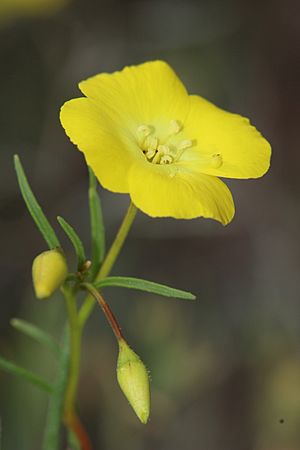California suncup facts for kids
Quick facts for kids California suncup |
|
|---|---|
 |
|
| Scientific classification | |
| Genus: |
Eulobus
|
| Species: |
californicus
|
| Synonyms | |
|
|
The Eulobus californicus, also known as the California suncup, is a type of flowering plant. It belongs to the evening primrose family. This plant grows naturally in California, Arizona, and nearby parts of northwestern Mexico. You can often find it in areas with scrub, chaparral, and desert plants.
What the California Suncup Looks Like
The California suncup is an annual plant. This means it completes its whole life cycle in one year. It starts with a group of leaves that grow close to the ground, like a circle. This is called a basal rosette.
How the Plant Grows
After the rosette forms, a thin, straight stem shoots up. This stem can grow very tall, sometimes more than 1.5 meters (about 5 feet) high! The biggest leaves are found in the rosette near the ground. The leaves on the stem are much smaller and look like thin threads.
The Flowers and Fruit
At the top of the stem, you'll find the flowers. They are spaced out on long, thin stalks called pedicels. Each flower looks like a cup and has four bright yellow petals. Sometimes, you might see small red dots near the bottom of the petals.
Behind the petals are four smaller, greenish parts called sepals. These sepals bend backward against the pedicel. After the flower blooms, it produces a fruit. This fruit is a long, tube-shaped capsule, usually 4 to 10 centimeters (about 1.5 to 4 inches) long.
See also
 In Spanish: Camissonia californica para niños
In Spanish: Camissonia californica para niños

